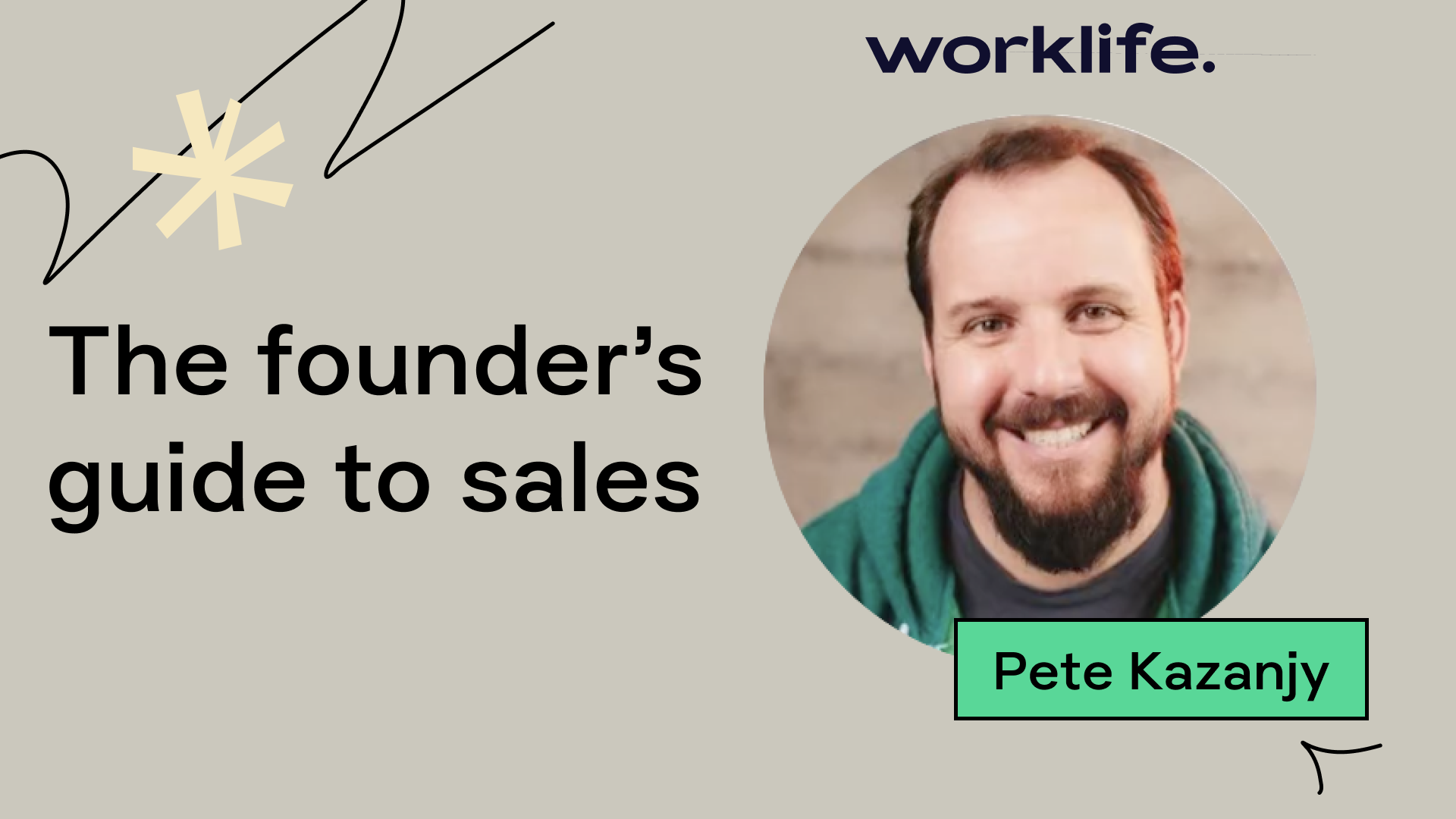“Know your why.” Entrepreneurs hear this phrase all the time when starting a business, but there’s a good reason: a strong personal connection to the business virtually guarantees brand authenticity and values-driven decision-making.
Whether founders are navigating the best way to reach customers or consistently improving the product experience, those who closely identify with the service or product they’re developing bring an unmatched level of authenticity to their work. And the result is something truly unique.
By now, we all know the value of bringing our full selves to work. This insight from coaching platform provider BetterUp sums it up perfectly: “When we [hit the “off” switch on our authentic selves], we create a compromised workspace for ourselves, our coworkers, and our managers. This environment then promotes lower levels of creative thinking, performance, and social connection. Only when we bring our whole selves to work will we thrive as a person and a professional.”
But for entrepreneurs—company leaders whose job it is to innovate, motivate, and excite employees, investors, and other stakeholders—the need to unleash the full self is arguably even more important. For one thing, leaders that are authentically committed to their company and are deeply aligned with its mission can make a more meaningful impact than those that are not. That’s likely because, according to a study from the Harvard Business review, 89% of company leaders said a sense of collective purpose drives employee engagement (goodbye employee burnout), and 84% percent said it leads to greater success in transformational efforts.
Meet the leaders who built brand authenticity into their startups
What does authentic leadership actually mean? How can entrepreneurs effectively bring the “self” to work in a meaningful way? And how does this translate to authenticity in business?
To answer, we’ll be sharing three brand authenticity examples you won’t want to miss:
- Candor’s Kelsey Bishop
- Katie Chen’s Kairos
- Kathryn Cross’s Anja Health
Candor’s Kelsey Bishop puts authenticity back in business
When Kelsey Bishop launched Worklife portfolio company Candor, her mission was to create a new professional networking site where people share how they work. The goal wasn’t just to record work history, but actually capture the experience of working on a certain team given an individual’s unique background.
As someone that has navigated the challenge of joining a company that was not a cultural fit, her company’s aim was a cause close to her heart. Bishop always wished that she’d been able to learn more about a team before taking on a new job. But the resources available for researching companies, such as LinkedIn and Glassdoor, only offer limited scope into what it’s like to work on a given team within a company.
Glassdoor, for example, provides only anonymous employee reviews, so it’s impossible to tell which team—or even location—a negative experience may be describing.
So Bishop decided to start a tech company that would help job seekers ensure that their next job was a company culture dream come true—not a nightmare.
Candor users take a self-test to discover their ideal workstyle. They then get input from colleagues they work with to build a profile capturing how they do their best work. Once completed, the profile has multiple uses:
- It helps individuals grow and develop by pinpointing areas where current teammates see room for improvement.
- It captures what it’s like to work with an individual, making it easier for future employers to assess cultural fit before an employee starts a job.
- It allows job seekers to see the profiles of individuals working at other companies. If they’re considering an offer, they can assess exactly what working with a potential new team would be like—and then judge if it’s a fit for their needs and style.
Candor recently announced its $5 million seed round, led in part by Worklife, and launched an updated platform.
Business authenticity is the M.O. at Katie Chen’s Kairos
Katie Chen loves to create. From the early days of her career when she was designing for Airbnb, to her role as lead designer at Slack, Chen has always been an artist. But as a creative that works closely with digital technology, she has seen first-hand how alienating it can be when the technology is hard to navigate and use when it’s new, complex, or inaccessible.
That’s why she co-founded Worklife company Kairos, a platform that makes it easy for artists of all types—from music to food—to use non-fungible tokens (NFTs) to sell their creations without writing a single line of code. Chen is so passionate about this subject that she recently gave a talk about it at our brand new Worklife Studios in Silver Lake.
Kairos lets NFT creators customize pre-designed templates for unique NFTs to make them more valuable and sell their wares from a branded storefront. The platform provides easy-to-use tools geared toward non-technical users for everything from contracts to community management, so creators can focus on their craft instead of building websites.
Kairos is built with several values that are important to Chen. For one thing, Kairos has a diverse team including many first-generation immigrants, giving this cohort of often-overlooked individuals an opportunity to grow within a budding startup.
In addition to inclusivity, sustainability is one of Chen’s top priorities. In fact, Chen opted to build her company on Solana blockchain, largely because of its sustainability and low carbon footprint. She recently explained that a single Ethereum transaction uses the same amount of power that an average U.S. household uses in 8.3 days, compared to Solana’s 0.02 minutes of power consumption per transaction.
Brand authenticity comes easy at Kathryn Cross’s Anja Health
Like many mixed-race families, Kathryn Cross’s parents struggled to find a life-saving umbilical cord blood match for her brother, who was diagnosed with cerebral palsy. After her brother passed away from pneumonia complications, she began creating TikTok videos to raise awareness around the importance of banking cord blood, especially among communities of color where donation rates are low.
When one of her videos got almost 3 million views and she gained 30,000 followers in a few short months, she realized that her immense reach could now enable her to help other families.
Cross then founded Anja Health, which offers affordable banking services for:
- umbilical cord blood
- cord tissue
- placenta stem cells
Anja Health is expanding access for families in need of cord blood for a range of needs, from dementia to cerebral palsy. Unlike other companies, Anja Health manually processes donated samples, which results in 25% more stem cells recovered from donors, and 80% less contamination. Simply put, they can do more with less.
The startup recently raised $4.5 million in seed money to grow the company and provide greater options for families in need of life saving cord blood. As Cross helps others, the memory of her brother remains at the forefront of her work.
How to build brand authenticity
A challenging personal experience can be the catalyst for a successful business, ultimately enabling founders to better understand the problem and bring a valuable solution to others who have gone through a similar experience.
Not sure where to start? Aspiring founders can also find inspiration in these questions:
- What would you do for free? This points to your passions.
- What are you doing to uplift others? The answer can help you figure out how to turn that passion into your purpose.
Once you start that next big endeavor, remember your purpose and “your why.” These should be the cornerstones of your motivation and your decision-making if you want to produce brand authenticity that users can feel.
Celebrating authentic brands
At Worklife, we celebrate those who dare to start something completely brand new, whether it’s building a tool for creators, scientists, businesses or anything in between. Supporting non-traditional founders from idea stages to a scalable business is in our DNA.
Got an idea for the next big thing that you put your whole self into? I’d love to hear about it on Twitter. You can also pitch us here.
Liked this article? Also check out:
- Worklife's Maturity Curve: The Future of Workplace Community
- Post Great Resignation, Individuals are Reimagining Work
- Meet the Asian American founders, entrepreneurs, and creatives changing how we work
- Why We’ll See More Influencers Become Entrepreneurs
- Art made by AI: the new tech powering the creator economy






